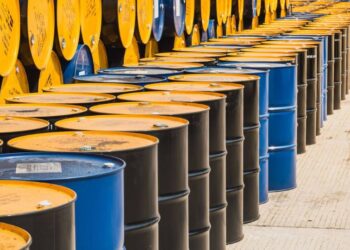Kuwait’s Al-Zour refinery has restored full operation of its crude oil distillation units 1 and 2, with production back up to 345,000 barrels per day (bpd), a spokesman for the refinery owner told S&P Global Commodity Insights on May 10.
Production has increased from 205,000 bpd on April 30. CDU 3 is expected to be ready by the end of 2023, bringing production to full capacity of 615,000 bpd, said Abdullah al-Ajmi, spokesman for Kuwait Integrated Petroleum Industries Co. (KIPIC). Al-Zour is one of several new refineries underway or starting up in the Middle East.
Rising to the top
Saudi Aramco’s Jazan refinery started in 2021 with a capacity of 400,000 bpd, Oman’s Duqm refinery is expected to start this year with a capacity of 230,000 bpd, and Iraq’s Kerbala refinery is also expected to start operations in 2023 with a capacity of 140,000 bpd. Supplies have already affected neighboring ports. A cargo of 665,210 barrels, or 104,758 tons, of low-sulfur fuel oil from Al-Zour was unloaded at the port of Fujairah on the east coast of the United Arab Emirates on May 3, the highest volume of LSFO from Al-Zour to Fujairah ever recorded, according to Kpler shipping data.
Heavy distillates used as fuel oil for power generation and as fuel for ships in Fujairah rose 19 percent in the week ending May 8 to 11.814 million barrels, the highest level since Feb. 27, according to port data shared exclusively with S&P Global. According to local traders, the supply of fuel oil has overwhelmed the demand for bunker in Fujairah lately. The premium of 0.5% sulfur marine fuel oil delivered to Fujairah over the 0.5% sulfur marine fuel oil cargo FOB Singapore fell to an average of $8.56/metric ton from May 2 to 9, compared with $11.34/metric ton in April, according to S&P Global data.KIPIC had said in April that its CDUs 1 and 2 were temporarily out of service due to a technical issue. The second CDU had only begun to operate in early March. Al-Zour is composed of three CDUs of equal capacity. It began exporting naphtha, jet fuel and low-sulfur fuel oil in November, after the first CDU was commissioned.
Production benefits Kuwait
The increased production has also allowed Kuwait to take advantage of local generation. The country’s Ministry of Electricity, Water and Renewable Energy received its first shipment of LSFO from Al-Zour on May 8 for domestic electricity. The LSFO is destined for the Al-Zour South power plant and is to be distributed to the country’s other power plants in a sequential manner, the state’s official news agency, Kuna, reported on May 9. KIPIC is a subsidiary of Kuwait Petroleum Corp. the state-owned energy conglomerate that also manages Kuwait Oil Co., Kuwait National Petroleum Co., Petrochemicals Industry Co. and Kuwait Oil Tanker Co.






